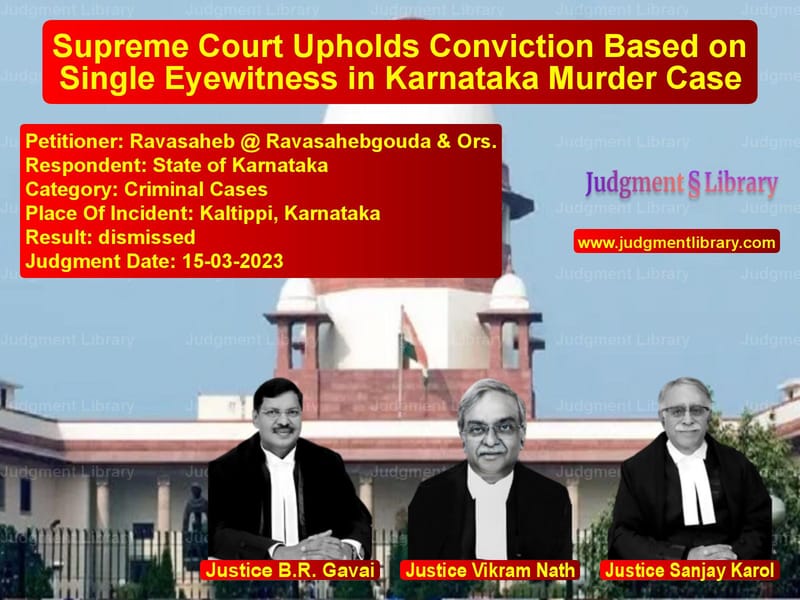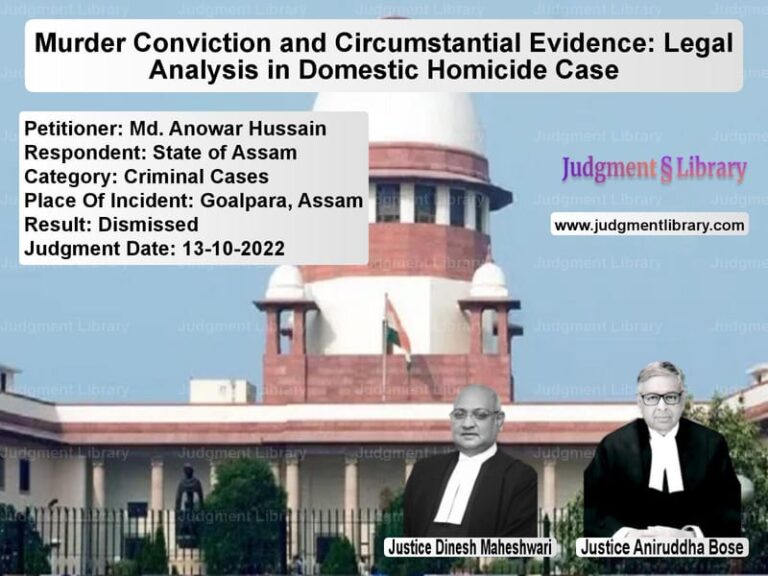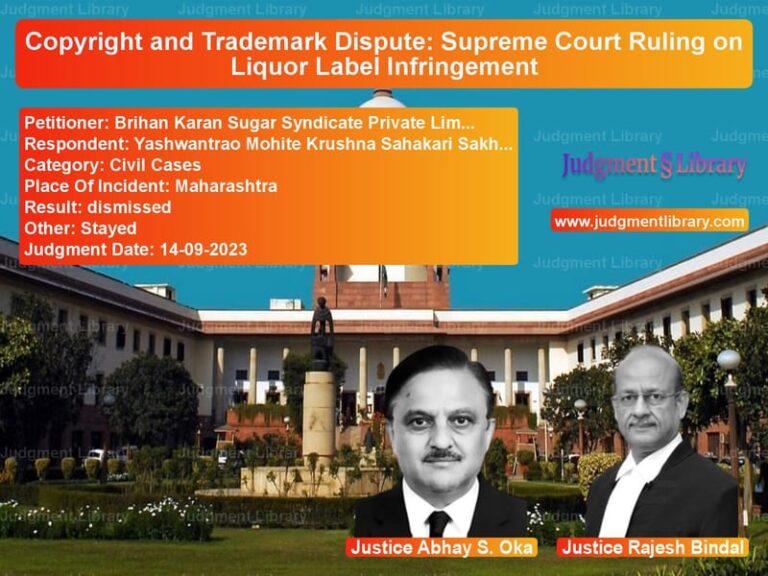Supreme Court Upholds Conviction Based on Single Eyewitness in Karnataka Murder Case
The Supreme Court of India, in the case of Ravasaheb @ Ravasahebgouda & Ors. v. State of Karnataka, upheld the conviction and life imprisonment of multiple accused for the murder of Satyappa, despite the case being based primarily on the testimony of a single eyewitness. The ruling reinforced the principle that a conviction can be sustained on the sole testimony of a credible witness if found trustworthy and corroborated by surrounding evidence.
Background of the Case
The case arose from the brutal murder of Satyappa in Kaltippi village, Jamakhandi Taluka, Karnataka, on August 13, 2004. The prosecution alleged that the murder was premeditated and resulted from a longstanding land and boundary dispute between the deceased and the accused.
On the day of the incident, around 2:45 PM, the accused allegedly ambushed Satyappa, attacking him with sharp-edged weapons, including jambia/jambe (daggers) and button knives. Chilli powder was also used to incapacitate the victim before he was stabbed to death.
Read also: https://judgmentlibrary.com/supreme-court-acquits-murder-convict-pradeep-kumar-freed-after-19-years/
A total of eight accused were convicted by the Trial Court, which relied heavily on the testimony of the sole eyewitness, Yankappa Panchagavi (PW-1), the deceased’s brother. The Karnataka High Court upheld the conviction, leading to the appeal before the Supreme Court.
Key Legal Issues
- Whether a conviction can be sustained solely based on the testimony of a single eyewitness.
- Whether the prosecution successfully established guilt beyond a reasonable doubt.
- Whether there were material discrepancies in the eyewitness’s testimony that would render it unreliable.
Petitioner’s Arguments (Ravasaheb & Ors.)
The appellants, represented by Senior Advocates Nagamuthu S. and Dr. K. Radhakrishnan, contended:
- The prosecution relied solely on the testimony of PW-1, who was the deceased’s brother, making him an interested witness.
- The witness’s testimony was inconsistent, as he failed to specify which accused inflicted which injury.
- Several prosecution witnesses had turned hostile, weakening the case.
- The presence of the accused at the scene was not disputed, but their role in the actual murder was questionable.
- The conviction of eight accused persons based on the testimony of a single eyewitness was excessive and not supported by corroborative evidence.
Respondent’s Arguments (State of Karnataka)
The State, represented by the public prosecutor, countered:
- The testimony of PW-1 was consistent, clear, and supported by medical evidence.
- The use of sharp weapons and the number of injuries (21 stab wounds) proved the brutal nature of the crime.
- The hostile witnesses did not invalidate the prosecution case, as material aspects of their statements supported PW-1’s testimony.
- The accused had a clear motive, given their ongoing land dispute with the deceased.
- Legal precedents allow a conviction based on a single eyewitness if the testimony is credible.
Supreme Court’s Analysis and Judgment
The Supreme Court bench, comprising Justices B.R. Gavai, Vikram Nath, and Sanjay Karol, upheld the conviction and dismissed the appeal.
“The presence of the accused at the scene is undisputed, and the testimony of PW-1, despite being that of an interested witness, is credible and corroborated by circumstantial evidence. The courts below have correctly convicted the accused based on quality rather than quantity of witnesses.”
Key Observations:
- Credibility of a Single Eyewitness: The Court reiterated that a conviction could be based on the testimony of a single eyewitness if found credible, as per the ruling in Karunakaran v. State of Tamil Nadu and Sadhuram v. State of Rajasthan.
- Hostile Witnesses: The Court held that even if witnesses turn hostile, portions of their testimony that corroborate the prosecution case remain admissible.
- Interested Witnesses: The Court rejected the argument that PW-1’s testimony should be discarded merely because he was the deceased’s brother, citing Bhagwan Jagannath Markad v. State of Maharashtra, which held that an interested witness’s testimony must be assessed on its merit.
- Section 149 IPC (Unlawful Assembly): The Court ruled that even if all accused did not inflict injuries, they were guilty by virtue of being part of the unlawful assembly that executed the murder.
Key Takeaways from the Judgment
For Criminal Law:
- A single credible eyewitness is sufficient for conviction if their testimony is clear and reliable.
- Courts should focus on the quality, not the quantity, of witnesses.
For Judicial Procedures:
- Testimonies of hostile witnesses can still be relied upon if corroborative.
- Delay in sending the FIR to the Magistrate does not automatically invalidate the prosecution case.
For Law Enforcement:
- Proper documentation of eyewitness testimonies strengthens the prosecution case.
- Ensuring that crime scene investigations support eyewitness accounts is crucial.
Conclusion
The Supreme Court’s decision in Ravasaheb @ Ravasahebgouda & Ors. v. State of Karnataka establishes that a conviction can be based on the testimony of a single reliable eyewitness. It reinforces the importance of witness credibility over numerical strength and sets a precedent for future cases involving multiple accused.
The judgment serves as a significant reference in criminal law, emphasizing that procedural lapses and hostile witnesses do not necessarily weaken a prosecution case if the core testimony remains intact.
Petitioner Name: Ravasaheb @ Ravasahebgouda & Ors..Respondent Name: State of Karnataka.Judgment By: Justice B.R. Gavai, Justice Vikram Nath, Justice Sanjay Karol.Place Of Incident: Kaltippi, Karnataka.Judgment Date: 15-03-2023.
Don’t miss out on the full details! Download the complete judgment in PDF format below and gain valuable insights instantly!
Download Judgment: ravasaheb-@-ravasahe-vs-state-of-karnataka-supreme-court-of-india-judgment-dated-15-03-2023.pdf
Directly Download Judgment: Directly download this Judgment
See all petitions in Murder Cases
See all petitions in Bail and Anticipatory Bail
See all petitions in Judgment by B R Gavai
See all petitions in Judgment by Vikram Nath
See all petitions in Judgment by Sanjay Karol
See all petitions in dismissed
See all petitions in supreme court of India judgments March 2023
See all petitions in 2023 judgments
See all posts in Criminal Cases Category
See all allowed petitions in Criminal Cases Category
See all Dismissed petitions in Criminal Cases Category
See all partially allowed petitions in Criminal Cases Category







